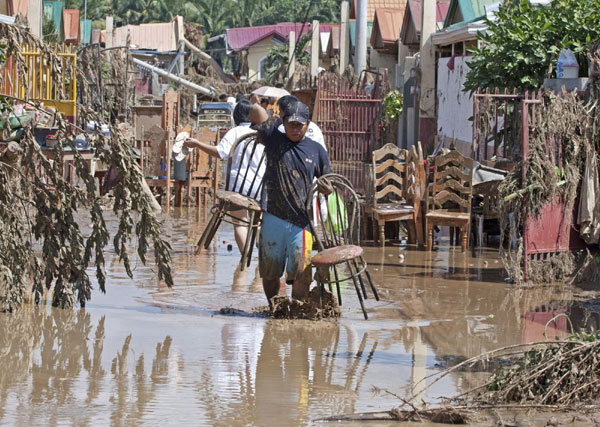Philippines searches for missing after typhoon kills 500
Updated: 2011-12-18 15:03
(Agencies)
|
|||||||||
|
 |
|
A resident carries items he salvaged from his damaged shanty after flash floods brought by Typhoon Washi (Sendong) hit Iligan city, southern Philippines December 18, 2011. Rescuers searched for more than 100 people still missing in the southern Philippines on Sunday after flash floods and landslides swept houses into rivers and out to sea, killing almost 500 people in areas ill-prepared to cope with deadly storms. [Photo/Agencies] |
By Erik De Castro CAGAYAN DE ORO, Philippines - Rescuers searched for more than 100 people still missing in the southern Philippines on Sunday after flash floods and landslides swept houses into rivers and out to sea, killing almost 500 people in areas ill-prepared to cope with deadly storms.
The cities of Cagayan de Oro and nearby Iligan on Mindanao island were worst hit when Typhoon Wasi slammed ashore while people slept late on Friday and early Saturday, sending torrents of water and mud through villages and stripping mountainsides bare.
"This is the first time this has happened in our city," Vicente Emano, mayor of Cagayan de Oro, said in a radio interview. He said officials in the area did not receive adequate warning before the typhoon struck.
The Philippine National Red Cross (PNRC) estimated 497 were killed in eight provinces in the southern Mindanao region, with more than 100 still missing.
"It's difficult to be certain on those missing," Gwendolyn Pang, secretary-general of the PNRC, told Reuters. "The floods washed out whole houses and families inside. It's possible entire families are dead and no one is reporting them missing."
The latest report by the state disaster agency said 327 people had been killed and 274 were missing.
Disaster and health officials were struggling to deal with the scores of bodies that have been recovered. Some have been stacked one on top of another in local mortuaries.
Mindanao island, the southernmost in the Philippines, is a mineral-rich region that also produces rice and corn but is not normally on the path of an average 20 typhoons that hit the Southeast Asian country each year.
"This pose challenges to us ... We need to educate people with this kind of change in climate," Pang said. "The volume of rainfall for one month fell for just one day."
Rescued by Cargo Ship
Typhoons normally strike the central Visayas region and the southern tip or the eastern part of Luzon, the main island in the north.
Carmelita Pulosan, 42, said she and eight family members and neighbours survived by sitting on top of the tin roof of their house as it drifted miles into the open sea after floodwaters swept through their village.
They were rescued by a passing cargo ship.
"There was a deafening sound followed by a rush of water. We found ourselves in the river and the current took us out to the sea," Pulosan, from Cagayan de Oro, told Reuters.
"The current was very strong. God is really good to us. He saved my family," she said. Only one 3-storey building was left standing in their village, Pulosan said.
Pang said many residents returned to their villages after floodwaters receded, but many found their homes destroyed.
US Secretary of State Hillary Clinton said the United States, a major ally of the Philippines, was ready to assist Philippine authorities.
Wasi, downgraded to a tropical storm with gusts of up to 80 km per hour (50 miles per hour), is now hovering 60 km (40 miles) west of the southwestern city of Puerto Princesa and is expected to move out of Philippine waters later on Sunday.











